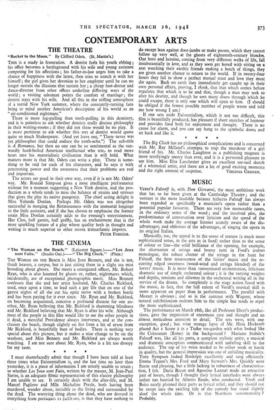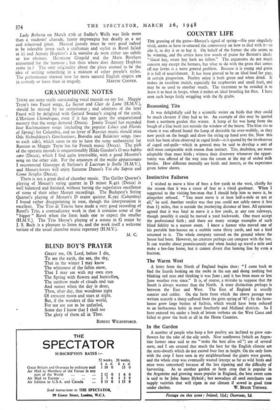MUSIC
VERDI'S Falstaff is, with Don Giovanni the most ambitious work that has so far been given at the Cambridge Theatre ; and the venture is the more laudable because hitherto Falstaff has always been regarded as specifically a musician's opera rather than a potential popular favourite. There are very few memorable tunes, in the ordinary sense of the word ; and the involved plot, the predominance of conversation over lyricism and the speed of the whole work make the average listener acutely aware of the dis- advantages' and oblivious of the advantages, of singing the opera in its original Italian.
Musically, too, the appeal is to the sense of texture (a much more sophisticated sense, in the arts as in food) rather than to the sense of colour or line—the solid brilliance of the opening, for example, the alternation of strings and brassy tutti in Ford's jealous monologue the robust chatter of the strings in the hunt for Falstaff, the firm tenuousness of the fairies' music and the re- curring edged sweetness (wood-wind and strings blended) of the lovers' music. It is more than conventional orchestration, felicitous dramatic use of simple orchestral colour ; it is the varying weights and depths, tensions and détentes in the orchestral writing all in the service of the drama. So completely is the stage action fused with the music, in fact, that the full extent of Verdi's musical skill is more apparent on paper than in performance. The parallel with Mozart is obvious ; and so is the contrast with Wagner, whose natural exhibitionism endears him to the simple but tends to repel the more sophisticated.
The performance on March 18th, like all Professor Ebert's produc- tions, gave the impression of enormous care and thought and an almost meticulous attention to detail. The sets were, with one exception, good ; but what strange lapse of Mr. Hein Heckroth placed Act i Scene 2 in a Tudor tea-garden with what looked like the Colosseum (Rome) in the background ? Mariano Stabile's Falstaff was, like all his parts, a complete stylistic unity, a musical and dramatic conception communicated with unfailing skill to the audience. The top of his voice tended to be either weak or harsh in quality, but the general impression was one of unfailing musicality. Tony Sympson looked Bardolph excellently and sang efficiently. Emma Tegani's Mrs. Ford and Mary Stewart's Mrs. Quickly were fluent and pleasing, but a little lacking in robustness of characterisa- tion, I felt. Dania Bayan and Agostino Lazzari made an attractive pair of lovers, though I thought their lyrical interludes were always rather too hurried by Alberto Erede, who conducted. Verdi and Boito surely, planned their parts as lyrical relief, and they should not be swept into the swirling tide of the comedy but stand slightly aloof the whole time. Or is that Northern sentimentality ? Probably.
Lady Rohesia on March i7th at Sadler's Wells was little more than a students' charade, funny impromptu but deadly as a set and rehearsed piece. Musical parody must be very good indeed to be tolerable (even such a craftsman and stylist as Ravel failed at it) 'and Antony Hopkins's a la maniere de were either too subtle or too obvious. Hermione Gingold and the Marx Brothers accounted for the humour ; but then where does Antony Hopkins come in ? The only originality about the piece seemed to be the idea, of writing something in a mixture of other people's styles. The performance showed how far more natural English singers are



































 Previous page
Previous page